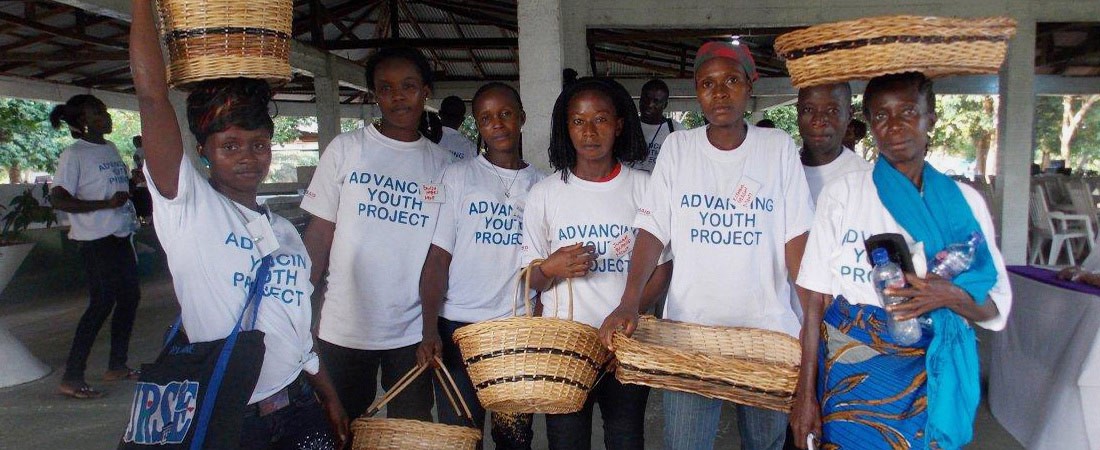Background: Liberia has experienced two civil wars (1980-1996 and 1999-2003) which have stagnated the economy and damaged institutional systems. The country has been engaged in recovery efforts since 2003, but the effects of the unrest are still felt in everyday lives. Eighty-four percent of the population of 4.1 million people lives below the poverty line. The 75% of the population below 35 years includes many young people with inadequate education/training, contributing to high youth unemployment.
The government faces challenges delivering basic education. In terms of even basic infrastructure, in 2010, only 40% of schools were made of brick and mortar and, of these, about half were damaged. Schools have limited toilet and water facilities, and vastly inadequate learning material. Only about half of all primary school teachers are trained. These deficiencies are reflected in low learning outcomes.
Implementation: The Advancing Youth Project was launched in 2012 as an initiative of the United States Agency for International Development (USAID), in partnership with Liberia’s Ministry of Education. The five-year project is supported by Mercy Corps and the YMCA, and runs in five out of fifteen counties in Liberia. Its target group is out-of-school youth aged 13-35 years with low numeracy and literacy skills, especially those who had their education disrupted by the war.
The AYP works through government schools (which make up 60 percent of all primary schools) to increase young people’s access to basic education (literacy and numeracy) and work-ready skills. Skills training is either in direct income-generating skills such as food preservation, snail rearing and basket weaving, or in occupational skills such as auto mechanics, tailoring, plumbing or welding. Training is provided in partnership with agencies including the Liberian Opportunities Industrialization Centre (LOIC), Grand Bassa Community College, and the United Nations Industrial Development Organization (UNIDO). On completion of the skills training programs, participants are expected to start their own enterprises, although the project tries to place those who have received training in more technical skills.
The project had a budget of $35 million.
Challenges: AYP conducts training sessions by grouping beneficiaries within each community. Inadequate infrastructure (classrooms) hinders the concurrent provision of education and skills training services to both in and out-of-school youth during the day. To address this, training is done in the evenings, which allows participants to work and school at the same time. The ebola outbreak during the project period made it difficult for participants to gather for training. To avoid a break in the training process, radio broadcasts were used to provide lessons during this time.
Results: AYP enrolled more than 16,800 learners across 150 communities between 2012 and 2016, with about 70% being females. The program achieved this by training 1,200 facilitators and administrators who worked as education instructors. Through basic skills training, 2,500 beneficiaries have been able to develop livelihoods through food preservation, snail rearing and basket weaving. In addition, about 200 male youth gained employment in the construction of the Voinjama–Vahun road in Lofa County.
Sustainability: The collaboration between USAID, the Ministry of Education, local agencies and some labour actors (public and private) helped the program to identify employment opportunities and to provide the appropriate skills to participants to take up such opportunities. By increasing funding and including more labour actors, the project can be sustained and expanded to other counties.
Replicability: The success of AYP is underpinned by preliminary studies to understand the causes (political, economic and socio-cultural) and nature of youth unemployment. Second, the use of radio for distance education can be readily replicated in other countries.
References
Education Development Centre (2012). Advancing Youth Project: Labor Market Assessment — Liberia. Washington, DC: Author.
Philanthropy. (2014, November 13). Nonprofit Uses Radio for Education in Liberia. Retrieved from https://www.philanthropy.com/article/Nonprofit-Uses-Radio-for/152257
USAID. (2016, October). Advancing Youth Project. Retrieved from www.usaid.gov: https://www.usaid.gov/sites/default/files/documents/1860/AYP%20Fact%20Sheet%20October%202016.pdf
Project Details
Date: September 8, 2017
